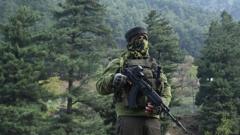Pakistan’s information minister, Attaullah Tarar, recently pointed to what he termed “credible intelligence” indicating that India plans a military strike within the next 24 to 36 hours. This warning follows an attack in Indian-administered Kashmir that left 26 tourists dead, an incident that has amplified tensions between the two nuclear-armed neighbors.
Escalating Tensions: Pakistan Warns of Imminent Military Strike by India

Escalating Tensions: Pakistan Warns of Imminent Military Strike by India
Amid rising hostilities, Pakistan claims India is poised for a military action against it, following a deadly attack in Kashmir.
The situation has escalated after India accused Pakistan of harboring militants responsible for the attack, which occurred near Pahalgam, a popular tourist destination. Tarar dismissed these allegations, asserting that India will utilize this attack as a “false pretext” to initiate military action. He added that Pakistan would respond to any military aggression decisively.
The deadly assault in Kashmir has reignited fears of conflict between the countries, who have a long history of disputes and have fought two wars over the region since their partition in 1947. The border has seen increasing exchanges of fire in recent days, leading to speculation about India's potential military response, reminiscent of its actions following militant attacks in 2016 and 2019.
In the wake of the attack, Indian authorities have mobilized extensive searches in the region, detaining over 1,500 individuals for questioning and demolishing homes believed to belong to militants. While a previously unknown group, the Resistance Front, initially claimed responsibility for the shooting, it later retracted its claim. Indian police have identified three suspects—two of whom are Pakistanis—but details remain scarce.
Survivors of the attack have reported that the gunmen specifically targeted Hindu men, which has further fueled anger across India. Prime Minister Narendra Modi vowed to pursue those behind the attack, promising that they will face severe punishment.
As the situation unfolds, diplomatic channels between the two nations remain tense, with both sides bracing for potential repercussions in this high-stakes environment.
The deadly assault in Kashmir has reignited fears of conflict between the countries, who have a long history of disputes and have fought two wars over the region since their partition in 1947. The border has seen increasing exchanges of fire in recent days, leading to speculation about India's potential military response, reminiscent of its actions following militant attacks in 2016 and 2019.
In the wake of the attack, Indian authorities have mobilized extensive searches in the region, detaining over 1,500 individuals for questioning and demolishing homes believed to belong to militants. While a previously unknown group, the Resistance Front, initially claimed responsibility for the shooting, it later retracted its claim. Indian police have identified three suspects—two of whom are Pakistanis—but details remain scarce.
Survivors of the attack have reported that the gunmen specifically targeted Hindu men, which has further fueled anger across India. Prime Minister Narendra Modi vowed to pursue those behind the attack, promising that they will face severe punishment.
As the situation unfolds, diplomatic channels between the two nations remain tense, with both sides bracing for potential repercussions in this high-stakes environment.






















